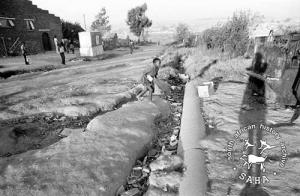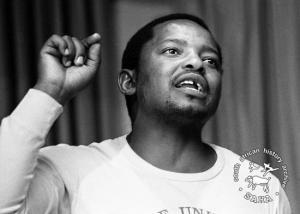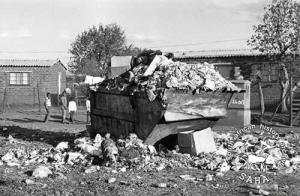 Following the 1976 student uprisings, which started in Soweto but soon spread to many other townships across the country, inter alia, aroused "the anger related to deep-rooted grievances over housing, transport, influx control, liquor, crime, corruption, and complete denial of meaningful political rights" for black people.This forced the government to introduce reforms, particularly in relation to black local government.
Following the 1976 student uprisings, which started in Soweto but soon spread to many other townships across the country, inter alia, aroused "the anger related to deep-rooted grievances over housing, transport, influx control, liquor, crime, corruption, and complete denial of meaningful political rights" for black people.This forced the government to introduce reforms, particularly in relation to black local government.
In 1977 the government initiated the Community Councils and in 1982 upgraded them to Town Councils, under the Black Local Authorities Act. The government vested limited powers on these councils but without financial muscle. Therefore, to raise revenue for purposes of developing the townships, the councils increased rent and service charges.
This caused the residents in different townships, including Tembisa, to establish civic structures to resist the rent and service charge increases:
As Greg Malebo explains:
"In 1979 or 1980 there about - we formed the Tembisa Civic Association with Goba Ndlovu. And Goba Ndlovu was the chairperson. We had a very big meeting in some church at Ndulwini to resist rent increase. In that meeting Lazarus Mawela was present. Alex Segale was there. And Thlaki Lekganyane was there, and became a member of the association."
Despite taking up the issue of rent and service charges, the Tembisa Civic Association (TCA) was from the outset plagued by tensions caused by differences in tactical and strategic approaches. Goba Ndlovu's faction within the association was not amenable to a militant approach whilst others within the TCA favoured this approach.
Goba Ndlovu was an elderly person and naturally we would get impatient with the manner in which he wanted things done. As young people we wanted to go on marches. We wanted resistance. Goba Ndlovu did not want to follow that line. Goba Ndlovu was from the Non- European Unity Movement and this movement was a talk-shop really. We wanted action; something Goba did not want. We were planning a stayaway. Tembisa was in a terrible state. [We wanted] the bucket system to be done away with; the rent increase, the state of roads and [we wanted] the building of another high school. Then it was Boitumelong and Tembisa High. We were using all that to mobilize. But Goba held the [TCA], and wanted us to distance ourselves from COSAS and to us COSAS was our formation.
The situation reached a boiling point when the ANC-aligned members of the TCA pushed for the association to be affiliated in the United Democratic Front (UDF), a multi-racial front launched in August 1983 to oppose the government's Tri-cameral Parliamentary system which excluded blacks.64 Just like Cosas, the UDF had also adopted the Freedom Charter as its guiding document. For many, this signaled its close alliance with the ANC. Moreover, some of its leading members like Albertina Sisulu and Archie Gumede had been members of the ANC since the 1950s.
David Masina, who was a member of the TCA, explains the reason for the differences within the TCA:
"Yes, we were starting to organise. We started in the TCA ... We were fighting for the leadership. Some were saying ‘No, we are supposed to be autonomous and not affiliate to any other thing (i.e. formation).' But we knew the ANC's background and we wanted to put it under the ANC. We were in the TCA, but part of the ANC in Botswana. ... We didn't tell them that we are the ANC. We say, ‘Let's adopt the ANC's strategy and use the Freedom Charter ... [the other faction argued] No, no we don't want to see those things'. Now we have cliques within the TCA. There was Goba [Ndlovu] ... [and his] gang who said ‘No, you see these people are coming with things we don't want. We just want to be TCA'."
The younger and more militant members of the TCA ignored Goba's vision for the TCA and called community meetings and invited leading figures within the UDF to come and address the community.
"We invited Terror Lekota to come and address the TCA meeting and we did not inform Ndlovu. We were dishonest to Ndlovu, because we told him that we wanted to call a community meeting so that we could discuss the problems the community was facing in the township. Ndlovu agreed. We did not tell him that we had invited Terror Lekota and Popo Molefe to address the meeting. He did not attend the meeting, but some of his ‘people' came. After the meeting, Ndlovu called us, Lazarus Mawela and myself, to a kind of a disciplinary sitting. I think it was during this period that after assessing the situation we concluded that there was no way that the TCA was going to be part of the UDF and we wanted it to affiliate in the UDF. We started recruiting trade union members to become part of the civic we were planning to establish."
Timothy Mabena, who was part of the defecting faction, remembers that he was tasked with the responsibility of recruiting members for the Tembisa Residents Association (TRA):
"It was clear that the people who were leading the TCA were not on the side of the ANC. Paul Maseko, who was the chairman of Tembisa COSATU Local, and myself were given a task to recruit members for the civic association we were planning to establish. We recruited many shop stewards. We were given directives that we should establish a civic association that would deal with civic matters (or bread and butter issues), like rent, electricity, bucket system and sewerage. Maseko and I were told to form sectional committees. All the 52 sections were supposed to have a committee, which would then constitute the TRA. To beef up our man power we recruited other comrades like Ali Tleane and started working with them. Maseko became the president, Tleane the deputy president, and I was the secretary of the TRA. Our educational officer was Amon Msane. Lazarus Mawela, Greg Malebo were also in the executive of the TRA. It was during the TRA's tenure that we established the street committees. During this period in Tembisa there was no crime."
Similarly, Mncedisi Prince Sibanyoni adds:
"The TRA was formed. And it was brought to the agenda that the TCA betrays people. The TRA enjoy[ed] a lot of support here in Tembisa. I remember when rallies were called and the stadium would be full ... Then activities pursued by the TRA did not only centre around the council issues; [it also dealt with] other issues that affected people. Issues of crime we'd engage. The leadership of the TRA then were people like Ali Tleane, Jappie Mokwevho, Timothy Mabena, Paul Maseko and Greg Malebo."
It was during the TRA's tenure that many of the Tembisa Town Councillors, including the Mayor Lucas Mothiba, resigned from the Council. In 1986 Mothiba, who had been the Mayor for seven years resigned, claiming "... many black people had lost faith in black local authorities because the structures were not of their making".

Observing the heightened political resistance in the township which forced the Tembisa Town Council collapse, in an effort to restore order, in May 1986 the national government sent in the South African Defence Force (SADF) to Tembisa.
The SADF manned roadblocks, stopped and searched driving into Tembisa. On 12 June it declared the State of Emergency. Political activists were detained en masse across the country; others were forced to either flee the country into exile or to operate underground. In Tembisa some of the leading activists were detained.
Greg Malebo remembers:
"During the state of emergency in 1986 I was detained and spent two years in Modderbee Prison."
Timothy Mabena concurs and adds:
"From 1986 until 1989 many of the activists Tembisa were detained during the State of Emergency. My wife and I were detained on the same day in 1986 at 2 o'clock in the morning. Matilda spent a day in detention and I was sent to Modderbee Prison."



